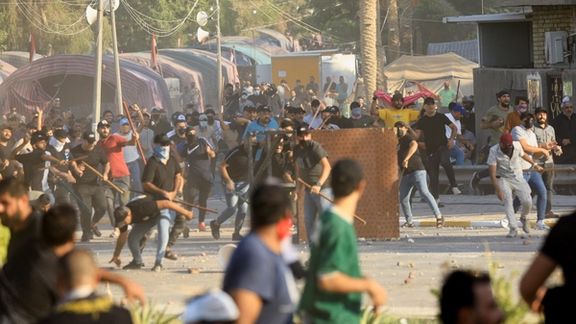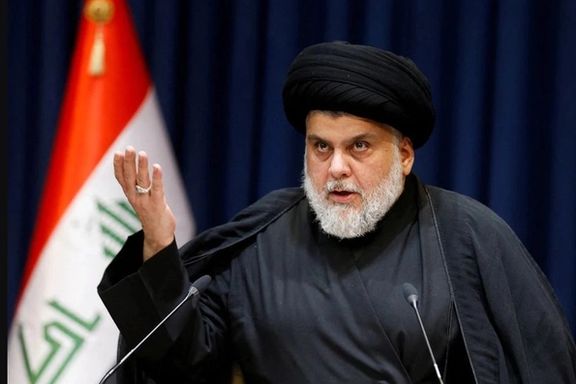Iraqi Army Declares Curfew After Sadrists Attack Government Buildings

Clashes between supporters of Moqtada al-Sadr and security forces were reported Monday in Iraq after the cleric announced his retirement from politics.
The government announced the postponement of a cabinet meeting, while Iran International’s correspondent in Iraq reported Sadrists storming governorate buildings in provinces including Basrah, south Iraq, and Maysan, also bordering Iran. They were chanting slogans against Iran and its interference in Iraqi politics. Fierce clashed also took place between Sadr's supporters and pro-Iranian groups.
Wary of a deteriorating security situation, the Iranian embassy warned nationals not to go to Kazimayn and Samarah, Shia shrines, and if in Najaf or Kerbalah to stay put.
Sadr – whose role in Iraqi politics goes back to the days of Saddam Hussein, overthrown by the United States-led 2003 invasion – won 73 of 329 seats in last October’s parliamentary election but has been unable to gain office after months of political haggling that has failed to produce a new administration.
The Sadrists withdrew from parliament June 13, prompting supporters to storm the building in July and to remain encamped outside ever since. Sadr’s announcement Monday of his ‘retirement’ enflamed supporters, with some storming government buildings in the fortified ‘green zone,’ central Baghdad.
AFP news agency reported shots being fired, possibly just in the air, and security forces using tear gas. The official news agency INA announced that military authorities had set a full curfew in Baghdad from 3.30pm local time.
Updates from out correspondent in Iraq said that widespread armed clashes errupted after dark between Sadr's militia and pro-Iran armed groups in Baghdad and Basra.
Risk of violent conflict?
After earlier ‘retirements,’ Sadr has returned to politics, and there have been suggestions he is trying to strengthen his negotiating hand over a new government rather than either stepping aside or even trying to seize power. Mustafa al-Kadhimi, caretaker prime minister since May 2020, is sympathetic to Sadr while not an ally.

Sadr has a long record of populism, based on active social-welfare networks built up from those of his father, Ayatollah Mohammad Sadeq al-Sadr, who was assassinated in Najaf in 1999. Moqtada Sadr’s Mehdi Army, originally active in resisting the post-2003 US occupation, is now formally part of the Iraqi armed forces alongside other Shia militia.
At various times Sadr has appeared close to Iran, but has more often positioned himself as an ardent Iraqi nationalist wanting to curb both Iranian and US influence. Some US-based analysts have suggested Washington should ally with Sadr against Iraqi groups closer to Tehran they call ‘proxies’, while other analysts have warned that Sadr brings the risk of Iraq falling into violent conflict.
The Coordination Framework, a Shia-led bloc including the Patriotic Union of Kurdistan and some Sunni groups, regards Sadr as an unpredictable firebrand. Common opposition to Sadr, despite other differences, holds the bloc together.
There have also been reports that Washington has tried in recent days to pressure Sadr to resolve differences with other Iraqi groups. Ambassador Alina Romanowski August 24 expressed concern to President Barham Saleh over Sadrists preventing courts functioning by protesting outside judiciary buildings.